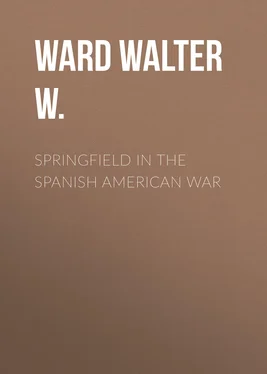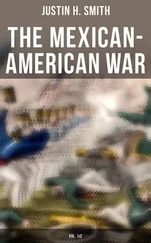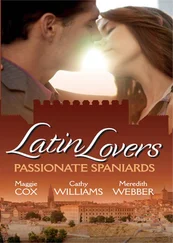Walter W. Ward - Springfield in the Spanish American War
Здесь есть возможность читать онлайн «Walter W. Ward - Springfield in the Spanish American War» — ознакомительный отрывок электронной книги совершенно бесплатно, а после прочтения отрывка купить полную версию. В некоторых случаях можно слушать аудио, скачать через торрент в формате fb2 и присутствует краткое содержание. Жанр: foreign_prose, История, foreign_edu, foreign_antique, на английском языке. Описание произведения, (предисловие) а так же отзывы посетителей доступны на портале библиотеки ЛибКат.
- Название:Springfield in the Spanish American War
- Автор:
- Жанр:
- Год:неизвестен
- ISBN:нет данных
- Рейтинг книги:3 / 5. Голосов: 1
-
Избранное:Добавить в избранное
- Отзывы:
-
Ваша оценка:
- 60
- 1
- 2
- 3
- 4
- 5
Springfield in the Spanish American War: краткое содержание, описание и аннотация
Предлагаем к чтению аннотацию, описание, краткое содержание или предисловие (зависит от того, что написал сам автор книги «Springfield in the Spanish American War»). Если вы не нашли необходимую информацию о книге — напишите в комментариях, мы постараемся отыскать её.
Springfield in the Spanish American War — читать онлайн ознакомительный отрывок
Ниже представлен текст книги, разбитый по страницам. Система сохранения места последней прочитанной страницы, позволяет с удобством читать онлайн бесплатно книгу «Springfield in the Spanish American War», без необходимости каждый раз заново искать на чём Вы остановились. Поставьте закладку, и сможете в любой момент перейти на страницу, на которой закончили чтение.
Интервал:
Закладка:
Life at Lakeland was fairly enjoyable. The temperature was high, ranging from 84 on one day it rained to 124 on a day it did not. We had our big wall tents we had brought with us from South Framingham and soon had them filled with more or less crude devices in the way of furniture. Mattresses there were none and our beds were Mother Earth which was of a brunette hue down there. Bathing in the lake was a favorite pastime between drills but after the muddy bottom had been stirred up a little it was a question whether we were dirtier before the bath or after it. There were all kinds of "Jo Jos" about a huge alligator who made his home in the lake but he had evidently heard of our appetites and kept out of sight.
The First cavalry, camped some distance on our right, had established a canteen soon after its arrival and it became a favorite place for our boys. A couple of days after our arrival we got our first mail from home and that day was a red letter one in our Lakeland life.
Just before reaching Lakeland some K company foragers had captured a goat at one of the stops but the owner pursued the animal to Lakeland and when he put in a claim for him Capt. Warriner ordered the "billy" given up. Our menu in camp was far more varied than on the train for "post" rations were being issued and the company cooks were "getting on to their jobs." Private Mandeville, who afterwards acquired much fame by being left behind at Fort Tampa, presided over the kitchen of G. In B company Walter Butler got up savory dishes and Private Harry Fisher looked after the culinary department for K. Butter was conspicuous by its absence from the table and one boy in K missed it so much that he dreamed of it. One night his dreams were so realistic that his cry of "Ma, please pass the butter," awoke his tent mates and that expression was the rallying cry in K for several days.
The death of Private Weslie Brass of Westfield, a member of I company, cast a gloom over the regiment and all the companies turned out to do escort duty when the body was shipped home. His was the first death in the regiment.
On Sunday, May 30th, orders came to break camp the following day and proceed to Tampa, which we did, arriving there on Monday afternoon, the 31st.
CHAPTER VII
WE STAY IN YBOR CITY AND THEN ENJOY (?) LIFE ON TRANSPORTS IN THE HARBOR
OUR stay in Tampa lasted from May 31st to June 7th and it was not wholly unenjoyable. In some respects the place was better than Lakeland, but we felt the heat far more than was the case in that town and the camp location was not as good as that of our camp there. But we were near Tampa and there were many opportunities for us to get to the city, our camp being in one of the suburbs some three miles from Tampa and known as Ybor City. Its population was made up mainly of Cubans and negroes and a number of cigar factories were located there. The Cubans were all "patriots" of course, but our disenchantment as to Cuban patriots had already begun and we paid them little attention. On our right was camped a battalion of the Fourth regular artillery (heavy) and this was probably the occasion of a rumor which had persistent circulation for several days that we were to be transformed from infantry to a heavy artillery regiment and assigned to sea coast duty.
We had a lovely time pitching our tents and making camp. Owing to a delay in laying out the camp it was not until after dark on the day of our arrival that we set to work to pitch our tents and as a result it was not only late before we got to sleep but the next morning considerable work had to be done in rectifying the alignment of the company streets. The soil was nice white sand which made fairly good beds.
On the afternoon of the next day we found out what a Florida "shower" could do when it tried. The rain came on unexpectedly and within a very few moments everything was in a flood. But few of the boys had taken the precaution to dig trenches around their tents and after the rain began to come down in sheets they were compelled to get out in it and dig or else have their quarters flooded. Here was where the value of the rubber blankets issued to us at South Framingham was shown.
It was while we were at Ybor City that our regiment was definitely assigned. We were put into the First Brigade of the Second Division of the Fifth army corps, our brigade commander being temporarily Col. Van Horn of the 22nd infantry while Gen. H. W. Lawton was in command of the division. This set at rest all the rumors about our being heavy artillery, cavalry and several other things. It also meant that we were to go to Cuba among the very first of the invading troops and there was no end of enthusiasm when this was understood.
During our stay in Ybor City Wagoners Kingston of B, Shene of G and Boule of K became expert drivers of the army mule wagon although their trials with the mule were many and various. In B street there were some pathetic scenes when the members of the Kanewah club got together and talked over how nice it would be "to be there" even if the gasoline stove did not always work.
Payday came June 4th and we got our first "whack" at Uncle Sam's good money. It was welcome, for since leaving South Framingham but little had been in circulation among our boys and we gave the paymaster the "glad hand." In return, he lined us up by companies and gave us greenbacks and a little silver. We had expected a full month's pay but were disappointed, our pay being calculated from May 3d, the day we had officially been mustered in, to the first of June. There were many applications for passes to visit Tampa that day and the majority of them were granted. The Seminole hotel and the stores in Ybor City and Tampa did a rushing business that afternoon and evening.
The "Wee Haws" of K contributed not a little to the gaiety of our camp life at this time and one of their songs to the air of "Rally 'Round the Flag" and reflecting upon the subsistence department was popular. It went like this:
Down with the hardtack!
Hurrah, boys, hurrah,
Down with the canned beef;
We wonder what you are;
For we'll rally 'round the beans, boys,
We'll rally once again
Shouting the battle cry of "Wee Haw."
'Please pass the butter,'
Hurrah, boys, hurrah!
If the coffee was much thicker
We'd sell it off for tar;
For we'll never look like Billy Fish
Unless we get more grub—
Shouting the battle cry of "Wee Haw."
Ade Potter's growing thinner,
Healey's just the same
Brazzil, Breck and Nesbitt swear,
Their biscuit box is lame;
For George Potter ate his canteen
And Aiken ate the strap
And McCullough shouts the battle cry of "Wee Haw!"
About this time some brainless individual sent alarming news home in a letter, which was published in the Springfield newspapers, to the effect that sickness was prevalent in our camp and that a large proportion of the men of the three companies from that city were in the hospital seriously ill. As a result we soon began to get letters of anxious inquiry from the folks at home, and it was some time before we could fully reassure them that the reports had been extremely exaggerated and that there was but little illness and none of a serious nature in our ranks.
While in Ybor City we lost two men, Privates Luther of K and Monteverde of G. Both were ordered to be discharged from the service, because of having enlisted while under age and without the consent of their parents or guardians. Monteverde was reluctant to leave the regiment and pleaded hard to be allowed to go with us to Cuba even as a civilian employee, and when that was refused he offered to go without any pay. But this was found to be impossible and he and Luther were obliged to return home. The case of Private John K. DeLoach of B company was a hard one. He had enlisted in South Framingham and in some way his relatives, who resided in Atlanta, Ga., heard of it, and as he was under age and had not their consent, applied for his discharge. Orders to have him discharged were issued but they failed to arrive while we were in Tampa, and did not reach us until after the regiment had landed in Cuba and done its share in capturing Santiago. DeLoach had done his duty during the most arduous part of the campaign, and as a result was given a "bob tail" discharge and left to get back to the United States as best he could. Sometimes the rewards of patriotism are not great, and this was certainly one of the instances.
Читать дальшеИнтервал:
Закладка:
Похожие книги на «Springfield in the Spanish American War»
Представляем Вашему вниманию похожие книги на «Springfield in the Spanish American War» списком для выбора. Мы отобрали схожую по названию и смыслу литературу в надежде предоставить читателям больше вариантов отыскать новые, интересные, ещё непрочитанные произведения.
Обсуждение, отзывы о книге «Springfield in the Spanish American War» и просто собственные мнения читателей. Оставьте ваши комментарии, напишите, что Вы думаете о произведении, его смысле или главных героях. Укажите что конкретно понравилось, а что нет, и почему Вы так считаете.












